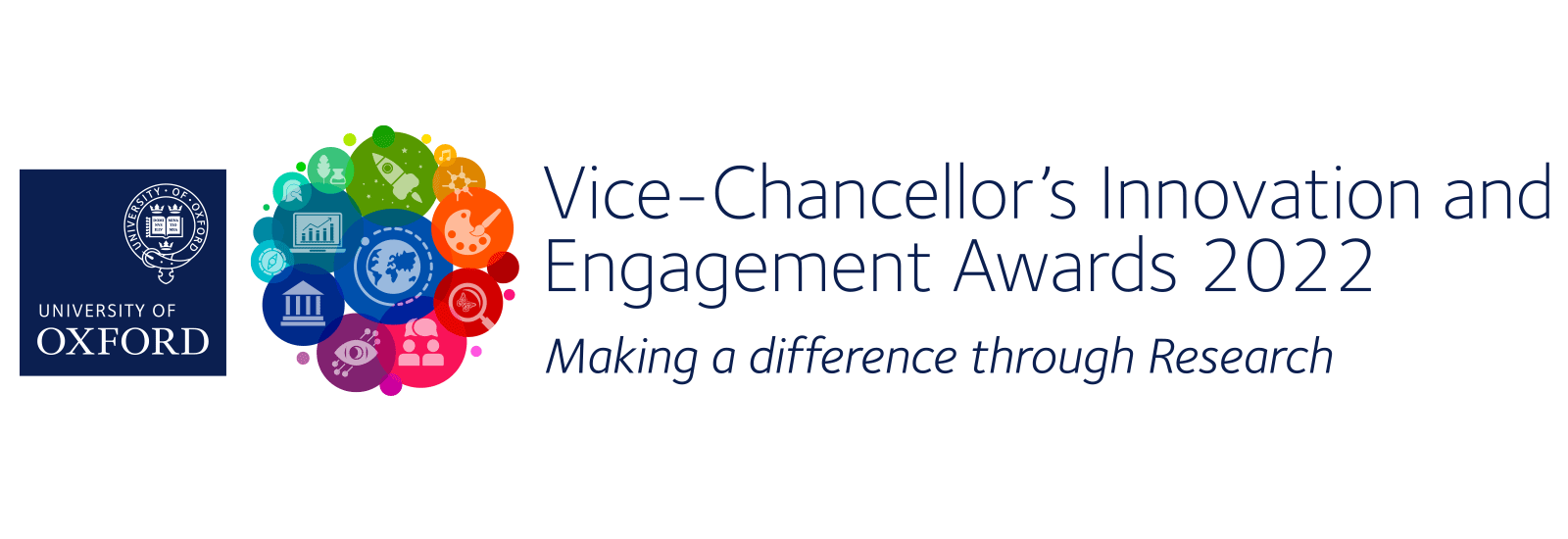
Vice-Chancellor’s Innovation & Engagement Awards 2022
Making a difference through research
From the Vice-Chancellor
I am delighted to launch the Innovation and Engagement Awards to give us an opportunity to learn about and to acknowledge the work of some of our extraordinary colleagues.
The mission of the University has not changed over the centuries. It is to push at the frontiers of knowledge, to educate the next generation, and to contribute to the world around us. It is through engagement beyond the university that we can translate our research for societal benefit.
This year’s awards are both inspirational and unusual in that they include submissions that have, quite literally, saved millions of lives around the world. They also demonstrate that innovation doesn’t necessarily involve creating something new, but can be just as effective when it involves thinking in new ways about established techniques or therapeutics.
I would like to thank all those who have submitted proposals to this year’s awards as well as everyone who participates in the University’s work on Innovation and Engagement.
I hope you enjoy reading about the projects described in the following pages and that they will inspire others to explore the possibilities of future projects.
Professor Dame Louise Richardson DBE
Vice-Chancellor
Winners
The Difu Simo Mental Health Awareness Campaign
Department of Psychiatry
The campaign is a collaboration between the Kenya Medical Research Institute (KEMRI) Wellcome Trust Research Programme, Documentary Institute of Eastern Africa, Malindi District Cultural Association, community members with lived experience of mental, neurological and substance use disorders (MNSDs), and the County Government of Kilifi.
People with MNSDs often face challenges such as stigma and discrimination because of the perceived negative beliefs about the causes, symptoms, and management of their problems. Stigma has a significant impact on their quality of life and influences the decision to seek care and adhere to treatment among people with these disorders.
In Kilifi County, while there is evidence of a significant burden of mental and neurological disorders, the state of mental health services, advocacy, and awareness interventions are limited and do not directly target or involve local communities within the region.
The idea to initiate a community and stakeholder-led mental health awareness campaign in Kilifi was inspired by the lived experience of Mr Changawa, a 52-year-old man with schizophrenia, who lived half of his life in chains because of the stigma associated with the mental health condition. Changawa’s case, which is shared through the Man in Chains documentary on the Difu Simo project website, culminated in the formation of the project to raise awareness of mental and neurological disorders and address the stigma which is prevalent in the rural area of Kilifi Kenya.
The project is currently conducted within the Epilepsy Pathway Innovation in Africa (EPInA) research project, which is funded by the National Institute of Health (NIHR). One of the aims of the NIHR is the use of innovative approaches to increase knowledge about epilepsy in the community.
Project Team:
Mary Bitta (Project Lead), Department of Psychiatry.
Judy Baariu, KEMRI-Wellcome Trust.
Key funders: National Institute for Health and Care Research (NIHR), Wellcome Trust.
Teaching Race, Belonging, Empire and Migration (TRACTION)
Faculty of English
TRACTION is a pioneering online platform which equips teachers to engage with issues of race, belonging, empire, and migration in the classroom. Developed by an interdisciplinary Arts and Humanities team, it is a unique new resource for secondary educators and education across the UK and beyond.
What does it mean to belong? Who belongs, and who doesn’t? From matters of race to immigration, to our historical understanding of empire, these issues have been a global topic of discussion in recent years. Difficult and challenging, they have put our collective understanding of history and culture under pressure. This, however, is nothing new: the Macpherson report (1997), published after the inquiry into the murder of 18-year-old Stephen Lawrence, noted that the place to challenge racism and build belonging was the national curriculum. Yet even in 2021, the ‘Lit in Colour’ report (Elliott et al.) found that only 12% of secondary and 13% of primary teachers in England had received training on talking about such topics in the classroom.
The TRACTION team’s response to this challenge draws on their years of experience in this area. TRACTION is the first online platform to provide teachers with the support and training they need to negotiate that difficult terrain, equipping them with cutting-edge research that they can use to enrich and extend their current teaching.
Focussed in the first instance on self-directed professional development for English and History teachers, the TRACTION Teaching Toolkit is a modular, out-of-the-box solution. Its three interdisciplinary modules, created by researchers and education experts at the University of Oxford, take teachers through research across the historical timeline from the 16th century up to the present day, while an additional module supports that specialist knowledge with practical, solidly embedded educational theory and pedagogy.
In addition, the Toolkit is supplemented by community-building facilities that allow teachers not only to connect with specialist researchers, but also to model best practices and share resources directly with each other, wherever they are in their journey.
Project Team:
Professor Nandini Das (Project Lead), Lennon Wendy; Faculty of English.
Dr Jason Todd, Department of Education.
Key Funders: European Research Council, Runnymede Trust.
Link for more information: http://www.tideproject.uk/research/announcing-traction-teaching-race-belonging-empire-and-migration/
LEAP Public Engagement – Meat Your Persona and Meat the Future
Oxford Martin School
We are facing a climate crisis. The food system contributes 25-30% to global greenhouse gas emissions, of which emissions produced by livestock account for c. 80%. Meanwhile, poor diets are one of the leading avoidable causes of ill-health. However, public understanding and mobilisation for dietary change to tackle these challenges are lacking.
Meat Your Persona empowered the public with accessible, research-based information and tools about the health and environmental impacts of meat consumption. Working with The Liminal Space, a creative design agency, the team built a touring installation in a bright yellow horsebox to take LEAP research to six cities (Cardiff, Leeds, Newcastle, Blackpool, Redcar, Glasgow). This included a quiz, take-away cards containing key facts to fit with your ‘meat persona’, and plant-based recipe cards. This stimulated visitors to discuss food and planetary health with researchers and locally recruited staff, to gain insight into our findings and, ultimately, to make better-informed choices about their diets. Independent evaluation showed the project reached over 100,000 people, and 75% said they would talk to others about the experience.
Meat the Future, in collaboration with Oxford University Museum of Natural History, presented LEAP’s research in a thought-provoking exhibition about the societal challenges and choices we face. Data was presented in a visually stimulating way, and visitors explored the environmental and health impacts of their own diets through digital interactives. Between May 2021 and May 2022, it attracted more than 250,000 visitors, alongside a diverse programme of events engaging families, students, and local communities, which involved 35 researchers and reached over 4,800 people. A new Eat the Future café at the Museum provided a largely vegetarian menu, implementing LEAP research by adopting innovative ‘eco-labels’.
Project Team:
Professor Susan Jebb (Project Lead), Lucy Yates; Primary Care Health Sciences.
Professor Paul Smith, Janet Stott; Oxford Museum of Natural History.
Amanda Gore, The Liminal Space.
Key Funders: International Food Policy Research Institute, Sainsbury’s, The Nature Conservancy, Wellcome Trust.
Link for more information: https://www.leap.ox.ac.uk/home
Supporting Online Justice – Enhancing Accessibility, Participation and Procedural Fairness
Faculty of Law
 (Image credit: Lucy Klippan)
(Image credit: Lucy Klippan)The transition toward online hearings in courts and tribunals has raised a number of questions about how prepared the public is for this innovation. Concerns have been raised that access to justice could be severely undermined as many users of the legal system may be ill-prepared, with limited equipment, bandwidth or skills required to engage effectively. These concerns were tested during the pandemic when there was often no alternative but to conduct hearings online with participants appearing ‘in’ court from their homes.
The Supporting Online Justice Project was an evidence-based communication and design project. It focused on how to best support lay users in online hearings by providing technical, legal, and emotional support to them in a series of open access, evidence-based films. The project engaged in a cycle of consultation, research, and design. This involved widespread engagement with national stakeholders; research on the legal process, design, and best practice; the production of prototypes; and their testing with lay and disadvantaged users of the justice system. The project team worked closely with HM Courts and Tribunals Service (HMCTS) as project partners, as well as members of the Judiciary and the advice sector.
The five films were launched in March 2022 and are attracting an average of around 500 views a week. Since the launch, the research team have been asked to produce a Scottish version of one of the films and a Makaton version for the Special Educational Needs and Disability Tribunal. The team have also secured further funding to work with HMCTS to produce a suite of resources for the advice sector.
Project Team:
Professor Linda Mulcahy (Project Lead), Dr Anna Tsalapatanis, Nikki Macmichael, Rowen Siemans, Lara Maclachlan; Faculty of Law.
Dr Emma Rowden, Oxford Brookes University.
Alison Bergin, HM Courts and Tribunals Service.
Key Funders: HM Courts and Tribunals Service, UK Research and Innovation.
Link for more information: https://www.law.ox.ac.uk/supporting-online-justice
Covid-19 response winners
COVID-19 Parenting Emergency Response
Department of Social Policy and Intervention
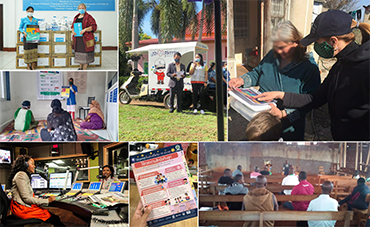 COVID-19 Parenting Emergency Response
COVID-19 Parenting Emergency ResponseCOVID-19 Parenting Emergency Response was based on rigorous research led by Dr Lachman, Professor Cluver and colleagues, who developed and tested the Parenting for Lifelong Health suite of in-person parenting programmes, which had been delivered to 300,000 families by the beginning of 2020.
COVID-19 brought a global challenge of unprecedented stress for families, through lockdowns, school closures and economic crisis, leading to sharply increased global rates of child abuse. In March 2020, the team initiated a collaboration with WHO, UNICEF, the Global Partnership to End Violence Against Children, World Without Orphans, The Early Childhood Development Action Networks, Clowns Without Borders South Africa, and 240 local NGOs to convert in-person parenting programmes into parenting tip sheets, cartoon videos, TV and radio scripts, public service announcements, and social media messages.
To facilitate rapid adoption, the materials were open-source and freely available. The team worked with governments, NGOs, and UN agencies to adapt and disseminate the resources for local settings, including national television in Pakistan, community radio broadcasts in Malawi, parenting hotlines in Montenegro, and food parcels in Nepal. Disability-adapted versions were shared with the Special Olympics and reached refugee camps through UNODC and UNICEF.
This work has also laid the foundation for a successful proposal to the LEGO Foundation and Oak Foundation for the Global Parenting Initiative (GPI). This exciting five-year initiative aims to innovate, evaluate, and accelerate the scale-up of human-digital parenting programmes in the Global South.
Project Team:
Dr Jamie Lachman (Project Lead), Professor Lucie Cluver, Dr Isang Awah, Amberley Barrington-Peek, Zuyi Fang, Louise Gordon, Dr Ohad Green, Susan Sentence, Saara Thakur, Dr Inge Wessels; Department of Social Policy and Intervention.
Slavica Gajdadzis-Knezhevikj, Professor Marija Raleva; Alternativa.
Professor Liane Alampay, Dr Rosanne Jocson, Bernice Mamauag, Jennel Reyes; Ateneo de Manila University.
Lauren Latona, Bard College.
Lindokuhle Ngcobo, Clowns Without Borders South Africa.
Nisso Nurova, Deloitte.
Sabine Rakotomalala, Global Partnership to End Violence Against Children.
Viorel Babii, Natalia Grandabour, Dr Lesco Galina; Health for Youth Association.
David Stern, IDEMS International.
Lara Breckon, Imperial College London.
Dr Jenny Doubt, Independent Research Consultant.
Brigitte De Hulsters, Lifecycle Consulting.
Koloina Kremer, Richemont International SA.
Rachel Machefsky, The Behavioural Insights Team.
Shekufeh Zonji, The Ealy Childhood Development Action Networks.
Stephen Blight, UNICEF.
Ivo Kunovski, University Clinic of Psychiatry.
Helen Mebrahtu, Kasonde Mwaba, Professor Lorraine Sherr; University College London.
Nicole Chetty, Dr Kufre Okop, Professor Catherine Ward; University of Cape Town.
Dr Alison Swartz, University of Cape Town & University of Essex.
Dr Alexander Butchart, World Health Organisation.
Phil Green, World Without Orphans.
Key Funders: LEGO Foundation, Oak Foundation, UKRI GCRF / Newton Fund, The Human Safety Net, UKRI Accelerating Achievement for Africa’s Adolescents (Accelerate) Hub, University of Oxford’s COVID-19 Response Fund.
Link for more information: https://covid19parenting.com/
The RECOVERY Trial of COVID-19 Treatments
Nuffield Department of Population Health; Nuffield Department of Medicine
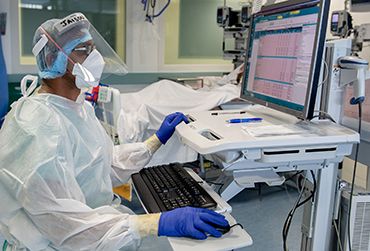 Randomised Evaluation of COVID-19 Therapy (RECOVERY) Trial.
Randomised Evaluation of COVID-19 Therapy (RECOVERY) Trial.In March 2020, it was clear that a severe wave of COVID-19 was about to hit the UK. With no known treatments for this new disease, healthcare services were bracing themselves for a sudden influx of hospitalisations. However, there was a chance that existing drug treatments may be effective against COVID-19.
A diverse team with expertise in clinical trial management and infectious diseases involving Oxford Population Health and the Nuffield Department of Medicine at Oxford University rapidly assembled, supporting a proposal to integrate a randomised controlled trial within the NHS to systematically test potential treatments for patients hospitalised with COVID-19.
RECOVERY recruited participants at an astonishing rate – 1,000 within the first two weeks, and 10,000 within the first two months. This led to the world’s first COVID-19 breakthrough after just three months: the steroid dexamethasone, which reduced deaths by up to a third for critically ill patients. The discovery was immediately adopted into clinical guidelines worldwide and has been estimated to have saved over a million lives.
Since then, RECOVERY has discovered three additional COVID-19 treatments, besides proving six potential treatments to be ineffective against COVID-19. To date, RECOVERY has recruited over 48,000 participants and continues to investigate potential treatments which could protect against new coronavirus variants.
Project Team:
Professor Sir Martin Landray (Project Lead), Graham Bagley, Richard Brown, Wojciech Brudlo, Sheena Camerson, Dr Mark Campbell, Andrea Cradduck-Bamford, Charlie Crichton, Professor Jonathan Emberson, Hannah Freeman, Raph Goldacre, Bob Goodenough, Professor Richard Haynes, Sarah Howard, Andy King, Professor Marian Knight, Dr Michael Lay, Professor Marion Mafham, David Murray, Sohmal Musini, Dr Guilherme Pessoa-Amorim, Dr Leon Peto, Kate Sawyer, Dr Natalie Staplin, Dr William Stevens,Karen Taylor, Karl Wallendszus, Richard Welsh, Anne Whitehouse, Sophia Wilkinson, Dr Caroline Wood; Nuffield Department of Population Health.
Professor Sir Peter Horby (Project Lead), Emmanuelle Denis; Nuffield Department of Medicine
Key Funders: National Institute for Health and Care Research, UK Research and Innovation, Wellcome Trust.
Link for more information: https://www.recoverytrial.net/
Quick Cash-based Poverty Relief during Covid-19
Blavatnik School of Government
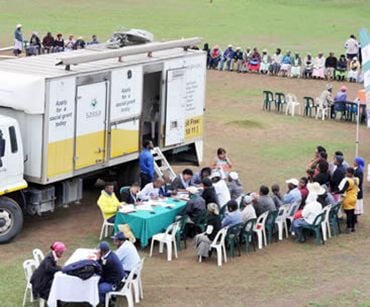 Distribute of emergency relief.
Distribute of emergency relief.In March 2020, South Africa implemented a strict COVID-19 lockdown, leading to three million people losing their jobs. In 2019, before the pandemic hit, 29.1% of adults in the country were already unemployed and 1 in 10 South Africans were going to bed hungry. This spiked to 1 in 5 people in April 2020: at that point, the government had yet to provide any emergency relief.
Efforts to distribute food parcels to the destitute began in April 2020, but the government struggled to implement this emergency relief at scale. Between April and July, only 1.2 million food parcels were distributed, while 9.8 million households were unable to buy enough food to cover basic needs.
Using evidence from their research and other research worldwide, Dr Kate Orkin and her team identified three immediate ways in which welfare policy in South Africa could be updated to reduce hunger and poverty during lockdown: cash grants paid via mobile phone instead of food parcels, unemployed benefits, and reduced paperwork.
During 2020 and 2021, the South African presidency commissioned her to make evidence-based recommendations. She formed a team of economists from the University of Oxford, the University of Cape Town and Duke University, who produced evidence review papers and simulated the impact of policy options for emergency relief. Combined with other expert recommendations and civil society pressure, their recommendations led to major policy changes.
Together, the team’s recommendations influenced spending of ZAR 97.5bn (GBP 4.87bn) which reached 28.5 million people in need. Independent analysis estimates the measures led to 5.5 million fewer people facing food poverty between April and June 2020.
Project Team:
Dr Kate Orkin (Project Lead), Marta Grabowska, Desmond Fairall, Alice Cahill; Blavatnik School of Government.
Brynde Kreft, Department of Economics.
Dr Robert Garlick, Ignacio Rodriguez Hurtado; Duke University.
Dr Yasmine Bekkouche, World Bank.
Dr Neil Rankin, Stellenbosch University.
Wim Louw, Abdul Latif Jameel Poverty Action Lab.
Saul Musker, Private Office of the President, Republic of South Africa.
Key Funders: UK Research and Innovation, Government of South Africa.
Link for more information: https://www.bsg.ox.ac.uk/research/research-and-policy-updates/getting-cash-based-poverty-relief-poorest-quickly-during-covid
The Oxford COVID-19 Vaccine: a vaccine for the world
Oxford Vaccine Group and Jenner Institute
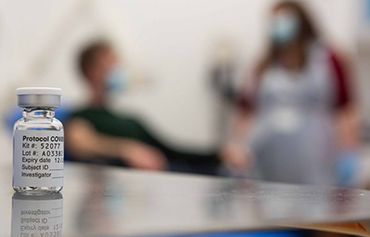 COVID-19 vacine.
COVID-19 vacine.In January 2020, the initial innovation was the construction of a vaccine to prevent pneumonia caused by a novel coronavirus which had been detected in Wuhan, hoping to help in controlling a local outbreak. However, as the global threat became apparent, the project changed into a novel innovative vaccine development programme, which proceeded at unprecedented speed and scale.
The multidisciplinary team brought together biologists to make and test the vaccine in the laboratory, experts in manufacturing to produce a high-quality product, and clinical trialists to test it in 24,000 volunteers.
The first volunteer was vaccinated on 23 April 2020. The initial studies showed immune responses, which were like those that were protective in animals, and similar immunity across all ages, including those at most risk. The next step in clinical development was international, representing both high-income and low and middle income populations, so that the team could prove the vaccine worked in geographically, ethnically and socially diverse populations.
The authorisation of the vaccine by MHRA on 30 December 2020 allowed vaccination to be launched and administered in the UK. With approval by the EMA at the end of January and endorsement by WHO in early February, the vaccine was distributed at scale globally, including as the major supplier through Covax to low-income countries from the Korean and Indian manufacturing sites.
An innovative close partnership with AstraZeneca ensured that the vaccine was manufactured around the world at over 20 international sites, defending local supply chains and ensuring more equitable access.
The project was the biggest engagement programme ever undertaken by the University’s public affairs team with 50 proactive stories, 40 press conferences, and 60 breaking reactive stories.
Project Team:
Professor Sir Andrew Pollard (Project Lead), Professor Sue Costa Clemens, Shaka Obhiozele, Hannah Robinson, Emma Plested, Yama Mujadidi, Dr Maheshi Ramasamy, Dr Sagida Bibi, Katherine Emary, Dr Rinn Song, Natalie Marchevsky, Dr Xinxue Liu, Dr Merryn Voysey, Professor Matthew Snape, Louise Bates, Dr Elizabeth Clutterbuck, Simon Kerridge, Dr Parvinder Aley, Sarah Kelly; Department of Paediatrics.
Dr Marion Watson, Dr Daniel Jenkin, Dr Alison Lawrie, Dr Amy Flaxman, Ian Poulton, Dr Paola Cicconi, Dr Pedro Folegatti, Professor Katie Ewer, Professor Adrian Hill, Professor Dame Sarah Gilbert, Professor Teresa Lambe; The Jenner Institute.
James Colman, Alexander Buxton; Public Affairs Directorate.
Professor John Bell, Professor Gavin Screaton; Medical Sciences Division.
Professor Catherine Green, Dr Carina Joe, Professor Brian Angus, Dr Alexander Douglas, Dr Angela Minassian; Nuffield Department of Medicine.
Heather House, University Administration and Services.
Sarah Pelling-Deeves, Research Services.
Dr Nisha Singh, Department of Psychiatry.
Dr Adam Ritchie, Blavatnik School of Government.
Professor Shabir Madhi, University of the Witwatersrand.
Key Funders: UK Research and Innovation, National Institute for Health and Care Research, Oxford Biomedical Research Centre, Coalition for Epidemic Preparedness Innovations, Chinese Academy of Medical Sciences Innovation Fund for Medical Science, CSIROxbridge Consortium, AstraZeneca.
Link for more information: https://www.research.ox.ac.uk/area/coronavirus-research/vaccine
Highly Commended
LanguageScreen
Department of Education
LanguageScreen is a mobile app that allows school staff to assess children’s language skills quickly and accurately. It is based on extensive research into children’s language development. LanguageScreen, together with two other apps from OxEd, allows education professionals to identify children who will benefit most from educational support.
Project Team:
Professor Charles Hulme (Project Lead), Dr Gillian West, Caroline Korrell, Sarah Hearne, Rachel Gardner, Rosanne Esposito; Department of Education.
Dr Mihaela Duta, Department of Computer Science.
Professor Margaret Snowling, Department of Experimental Psychology.
Chris Fellingham, Oxford University Innovation.
Dr Claudine Bowyer-Crane, National Institute for Economic and Social Research.
Dr Silke Fricke, University of Sheffield.
Key Funders: Nuffield Foundation, Department for Education.
Link for more information: https://oxedandassessment.com/
The Radical Hope and Critical Change Programme
Pitt Rivers Museum
Radical Hope connects academic researchers, Indigenous experts, artists, and community members to international audiences. One of the innovative aspects is that it pays non-academic experts a fee to ensure that no one is excluded from the conversations. The in-event chats are always lively, allowing worldwide researchers to exchange ideas. Since November 2020 there have been 26 events in the series.
Project Team:
Andrew McLellan (Project Lead), Beth McDougall, Jozie Kettle; Gardens Libraries and Museums.
Dr Lisandra Costiner, Faculty of History.
Abbey Palmer, Department of Education.
Key Funders: TORCH (The Oxford Research Centre in the Humanities), Clore Duffield Foundation, National Lottery.
Link for more information: https://www.prm.ox.ac.uk/radical-hope
ONS COVID-19 Infection Survey
Nuffield Department of Medicine; Nuffield Department of Population Health
The COVID-19 Infection Survey, a partnership between Oxford University and the Office for National Statistics, is the largest household survey of COVID-19 in the world. By collecting samples from approximately 180,000 individuals every fortnight, this ‘gold-standard’ study provided accurate data to a wide range of policy-relevant questions relating to vaccination, infection, antibodies, long COVID, and behaviours.
Project Team:
Dr Koen Pouwels (Project Lead), Professor David Eyre, Jia Wei; Nuffield Department of Population Health.
Professor Sarah Walker, Emma Pritchard, Nuffield Department of Medicine.
Dr Karina-Doris Vihta, Department of Engineering Science
Key Funders: Office for National Statistics
Link for more information: https://www.ndm.ox.ac.uk/covid-19/covid-19-infection-survey
‘after birth’: engaging with maternal mental health through theatre
Nuffield Department of Population Health
‘after birth’ is a play that uses emotion, humour and drama to engage the public with maternal mental health – the product of a four-year collaboration between researchers, theatre-makers, and women with lived experience. Gripping, life-affirming, funny, moving and uplifting, it aims to increase awareness, reduce stigma, encourage women to talk about their concerns and find support, ultimately, saving lives.
Project Team:
Professor Rachel Rowe (Project Lead), Professor Fiona Alderdice, Professor Marian Knight, Sophia Wilkinson; Nuffield Department of Population Health.
Dr Zena Forster, Maiden Moor Productions.
Dr Jess Heron, Action on postpartum psychosis.
Dr Rebecca Knowles-Bevis, Independent clinical psychologist.
Key Funders: Arts Council England, TORCH The Oxford Research Centre in the Humanties), Public Engagement with Research Seed Fund, North Wall Theatre’s Propeller 2020 Award, City University London, Sheila Kitzinger Programme at Green Templeton College.
Fairwork: Holding digital Labour Platforms Accountable
Oxford Internet Institute
There are tens of millions of digital platform workers over the world doing work via platforms or apps such as Uber, Deliveroo or Upwork. However, many platform workers face low pay, precarity, and dangerous working conditions. Fairwork evaluates the working conditions of digital platforms and ranks them on how well they do. Fairwork’s goal is to show that better and fairer jobs are possible in the platform economy.
Project Team:
Professor Mark Graham (Project Lead), Nancy Salem, Dr Matthew Cole, Daniel Arubayi, Dr Callum Cant, Fabian Ferari, Dr Kelle Howson, David Sutcliffe, Robert Warin, Dr Funda Ustek-Spilda, Alessio Bertolini, Adam Badger, Callum Cant, Jonas Valente, Michelle Gardner, Murali Shanmugavelan, Navneet Gidda; Oxford Internet Institute.
Srujana Katta, Blavatnik School of Government.
Professor Richard Heeks, University of Manchester.
Key Funders: European Research Council, Economic and Social Research Council, the Ford Foundation, the German Development Ministry and Oxford University’s Impact Engineering and Physical Sciences Research Council Acceleration Account Fund.
Link for more information: https://fair.work/
Project Partners: Jana Ababneh, Daniel Abs, Pablo Aguera Reneses, Iftikhar Ahmad, Gina Alaschkar , Maria Belen Albornoz, Luis Pablo Alonzo, Moritz Altenried, Oğuz Alyanak, Branka Andjelkovic , Thomas Anning-Dorson, Marcos Aragão, María Arnal, Arturo Arriagada, Daniel Arubayi , Tat Chor Au-Yeung, Ahmad Awad, Adam Badger, Marina Benedine, Ariane Berthoin Antal, Alessio Bertolini, Gautam Bhatia, Virgel Binghay, Richard Boateng, Manuela Bojadzijev, Macarena Bomhomme, Ameline Bordas, Maren Borkert, Álvaro Briales, Joseph Budu, Callum Cant, Rodrigo Carelli, Eduardo Carrillo, Chris King Chi Chan , Henry Chavez, Aradhana Cherupara Vadekkethil, Andrea Ciarini, Matthew Cole, Antonio Corasaniti, Pamela Custodio, Olayinka David-West, Nadia De Jesus, Luisa De Vita, Markieta Domecka, Marta D'Onofrio, Darcy du Toit, Veena Dubal, James Dunn-Willimason, Trevilliana Eka Putri, Nagham El Houssamy, Haya El Zayat, Batoul ElMehdar, Elisa Errico, Fabian Ferrari, Patrick Feuerstein, Roseli Figaro, Milena Franke, Sandra Fredman, Jackeline Gameleira, Pia Garavaglia, Beatriz Garcia, Chana Garcia, Michelle Gardner, Sharon Geeling, Navneet Gidda, Shikoh Gitau, Slobodan Golusin , Saúl Gomez, Mark Graham, Markus Griesser, Rafael Grohmann, Martin Gruber-Risak, Julieta Haidar, Khadiga Hassan, Richard Heeks, Mabel Rocío Hernández Díaz, Luis Jorge Hernández Flores, Victor Manuel Hernandez Lopez, Benjamin Herr, Kelle Howson, Francisco Ibáñez, Shahidul Islam, Tanja Jakobi, Athar Jameel , Hannah Johnston, Zeynep Karlidag, Lucas Katera, Mishal Khan, Maja Kovac, Martin Krzywdzinski, Amelinda Pandu Kusumaningtyas, Morad Kutkut, Arturo Lahera-Sánchez, Joy-Eveline Leeuw, Sebastian Lew, Jorge Leyton, Tatiana López Ayala, Bilahari Madhu, Raiyaan Mahbub, Amruta Mahuli, Melissa Malala, Oscar Javier Maldonado, Laura Clemencia Mantilla León, Claudia Marà, Paolo Marinaro, Ana Flavia Marques, Margreta Medina, Caterina Morbiato, Jamal Msami, Hilda Mwakatumbula, Baraka Mwaura, Mounika Neerukonda, Ana Negro, Sidra Nizambuddin, Thando Nkohla-Ramunenyiwa, Claudia Nociolini Rebechi, Kemi Ogunyemi, Caroline A Omware, Balaji Parthasarathy, Francesca Pasqualone, Obed Penu, Leonhard Plank, Valeria Pulignano, Jack Linchuan Qiu, Ananya Raihan, Antonio Ramírez, Juan-Carlos Revilla, Alberto Riesco-Sanz , Nabiyla Risfa Izzati, Nagla Rizk, Cheryll Ruth Soriano, Julice Salvagni , Derly Yohanna Sánchez Vargas, Maricarmen Sequera, Murali Shanmugavelan, Ruth Tarullyna Simanjuntak, André Sobczak, Shanza Sohail, Janaki Srinivasan, Anna Sting, Zuly Bibiana Suárez Morales , David Sutcliffe, Pradyumna Taduri, Kristin Thompson, Kiko Tovar, Pitso Tsibolane, Wing Yin Anna Tsui , Funda Ustek-Spilda, Jonas Valente, Jean-Paul Van Belle, Giulia Varaschin, Eduardo Vargas, Paola Vidriana, Laura Vogel, Jing Wang, Robbie Warin, Nadine Weheba